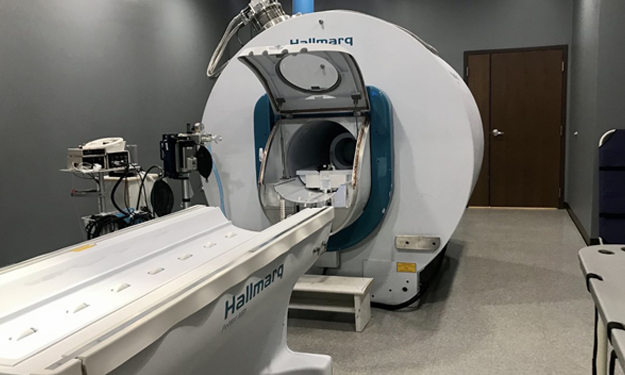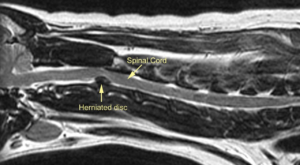What to Expect When Your Pet Needs an MRI
November 15, 2018
My veterinarian recommended an MRI for my pet. Now what?
Many of us have either had or know somebody that has had a CT (“CAT” scan) or an MRI at some point in their life. As in human medicine, advances in imaging have significantly increased our ability to quickly and safely diagnose the cause of a variety of illnesses in companion animals.
Many veterinary hospitals now have digital X-rays and ultrasound, and an increasing number of specialty and emergency veterinary hospitals have in-house computed tomography (CT) and/or magnetic resonance imaging (MRI). If your pet needs to have an MRI, your primary care veterinarian will likely refer you to a local veterinary neurologist or radiologist for evaluation and subsequent imaging if indicated.
Why Does My Pet Need an MRI?
In neurology, the clinical symptoms exhibited by a pet depend on where the disease is located rather than what disease process is present. In other words, a brain tumor, stroke, or infection in the same area of the brain cause very similar clinical signs so we cannot determine the cause of your pet’s illness on exam alone. As a result, advanced imaging is required in most cases.
With MRI and other sophisticated tests at our disposal, we are increasingly able to quickly and safely provide a more accurate diagnosis of your pet’s illness, in turn allowing us to more accurately treat and provide an improved quality-of-life for your furry loved ones.
What is an MRI?
MRI provides amazing clarity of the body’s tissues. MRI is the imaging tool most often recommended by veterinary neurologists and radiologists to evaluate the nervous system and sometimes the musculoskeletal system. In contrast to CT, which is better for bone evaluation, MRI is significantly better at imaging soft tissues, such as the brain, spinal cord, intervertebral discs, tendons and ligaments, and muscles.
Very small abnormalities, down to about 1-2 mm in size, can be detected with MRI that are otherwise missed on CT and other imaging techniques. MRI also allows us to obtain images from all three planes of the body, left-to-right, front-to-back, and top-to-bottom without having to move the patient. This gives us the ability to view the body three-dimensionally.
Take a look inside a veterinary MRI.
Is an MRI Safe for My Pet?
Unlike CAT scans, which involve taking many X-ray slices through the body, there is no radiation in MRI, so it is incredibly safe. MRI uses a powerful magnet to align the protons in the hydrogen of water molecules of the body in the same direction as the magnetic field. The computer then delivers a brief radiofrequency (RF) pulse that knocks the protons out of alignment. After the RF pulse ends, the protons return to alignment with the magnet, giving off energy that is detected by a receiver (“coil”) placed on or around the patient. This signal is then processed by a computer to provide a detailed image of the body.
Is My Pet Awake During an MRI?
MRI for animals is the same as for people, but unfortunately, our pets will not lie still. Any movement blurs the images so we cannot evaluate the pictures. As a result, dogs, cats, and other animals must be placed under general anesthesia for the MRI.
While this can be scary to consider, anesthesia risks are usually very low, and the vast majority of our pets do great under anesthesia. To help ensure this, we collect blood samples before anesthesia to evaluate the red and white blood cell counts, liver and kidney function, and electrolyte levels. This allows us to screen for underlying systemic diseases that might increase the risk of anesthesia. Chest X-rays are taken in older pets to screen for evidence of cancer spread to the lungs, pneumonia, or lung/heart conditions that may alter the decision to proceed with MRI.

MRI of the neck (head is to the left) from a dog with severe neck pain and moderate weakness & incoordination in all four legs. There is an intervertebral disc extrusion (“slipped disc”, “ruptured disc”) between the 2nd and 3rd neck pain causing spinal cord compression. The dog returned to normal following surgery to remove the ruptured disc material.
How Long Does it Take?
Once safely under anesthesia, the procedure usually takes between 45 minutes and 2 hours to complete depending on the region of the body being scanned. During this time, your pet is closely monitored by a veterinary technician. Since your pet is under anesthesia for the procedure, we have to focus our scan on the region of interest for patient safety, which is why “whole body” MRI is not usually performed in veterinary medicine. Once the images are obtained, they are evaluated by a neurologist or radiologist, often providing results to the client the same day.